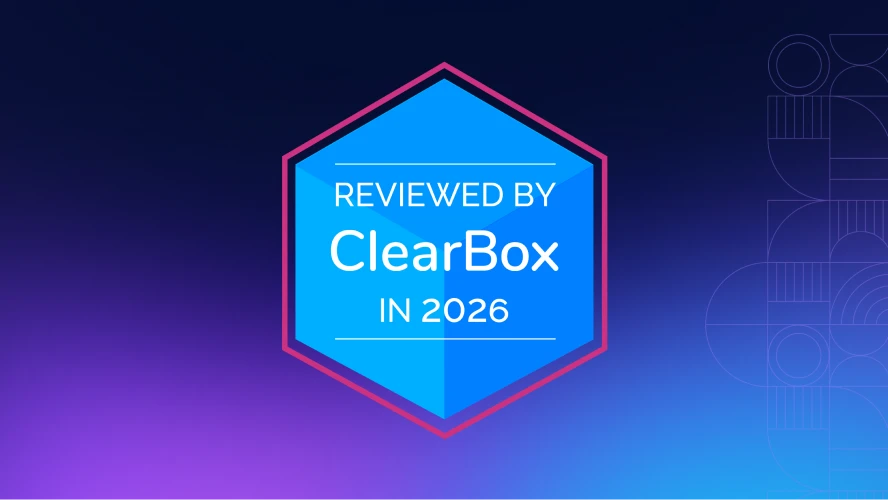Table of Contents
Work is changing. Hybrid models and remote teams are now the norm, and employees expect seamless, personalized, timely communications that help them feel connected, supported, and valued—wherever they are. The enterprises that succeed in the artificial intelligence (AI) era will be the ones who treat employee experience (EX) as a strategic initiative, not just an HR project.
This blog post explores trends shaping the employee experience in the AI era, steps to adapt the future of employee experience for AI, and how personalization at scale will define enterprise success:
Key Insights
- Digital divide threatens workforce unity – 80% of the workforce (deskless employees) are left out of critical communications, despite making up the majority of workers.
- AI adoption will fundamentally reshape job requirements – By 2026, nearly 80% of enterprises will adopt AI, requiring 75% of deskless workers to undergo significant upskilling.
- Employee well-being has evolved from performance imperative – With 77% of workers experiencing stress and burnout costing $1 trillion globally, well-being is now a core business strategy.
- Real-time listening replaces traditional feedback – Employees want continuous, two-way communication where feedback is acted upon, with 80% of those receiving meaningful feedback being fully engaged.
- Personalization at scale is the new standard – 53% of employees say organizational messages are only “somewhat relevant” to their roles, demanding workplace communications match personal app experiences.
- Fragmentation costs 20-30% in lost productivity – Despite 94% demanding flexibility, mixed work environments create data silos with employees wasting 9.3 hours weekly searching for information.
- Intelligent communication drives competitive advantage – Organizations modernizing communication report 60% boost in employee confidence, 30% increase in connection, and 23% increase in profitability.
The employee experience is now digital
The employee experience is made up of every interaction an employee has with your workplace. This includes everything from how employees collaborate with coworkers to how they interact with leadership to how they navigate workplace tools and access information. Today, many of these touchpoints are digital—and increasingly, they’ve got an AI bent, with more companies building AI into every point of EX.
The problem? Most digital workplace tools aren’t working equally for everyone.
Desk-based vs deskless employee experiences
Even at the same organization, desk-based and deskless employees have very different experiences.
For their part, desk-based employees are often inundated with notifications from multiple platforms, requiring constant context-switching and manual searches for critical updates. This experience is frustrating and distracting, ultimately driving higher productivity.
Deskless employees, on the other hand, are often entirely left out of communications—despite the fact that they make up 80% of the global workforce. Consider: 69% of organizations still rely primarily on email to reach employees, but 54% of deskless workers have only limited email access. As a result, they often miss critical information and end up feeling disconnected from their organization.
This digital divide creates a fragmented employee experience, where large portions of the workforce are left out of important communications. It’s not only an inefficient way of engaging employees; it’s unsustainable.
Understanding employee experience vs employee engagement vs employee journey
These terms are often used interchangeably, but their distinct meanings matter, especially when designing modern employee experience strategies.
- Employee experience: all interactions an employee has with an organization—from first interview to exit interview
- Employee engagement: how emotionally invested, committed, and satisfied employees are with their work and their organization
- Employee journey: the map of key touchpoints and milestones an employee experiences throughout their tenure at an organization
Each of these elements reinforces the others. A positive employee journey improves the experience, which fuels stronger engagement. Down the line, higher engagement drives better retention, higher productivity, and more business success.
In the AI era, organizations face challenges to support the employee experience at scale across a dispersed workforce with diverse needs, roles, and expectations.
5 employee experience trends in the AI era
To create a positive employee experience—and reap the improved performance, retention, and engagement that comes with it—organizations need to keep up with how AI is changing the workplace.
By 2026, nearly 80% of enterprises are expected to adopt AI. This rapid transformation will fundamentally shift the way we work, driving new demand for employee experiences that are more personalized, data-informed, and designed to suit hybrid work models.
Here’s a look at five trends shaping the future of employee experience:
- AI is reshaping work, roles, and required skills
AI is no longer just for the early adopters—it’s here to stay and will significantly shape the way we work, redefining roles and requiring organizations to rapidly upskill and retrain talent to keep pace.
According to the International Monetary Fund, AI adoption will impact 60% of jobs in advanced economies, changing 40% of workers’ core skills in the process. Specifically, deskless workers will face an upheaval: Analysts predict 75% of deskless workers will need significant upskilling to remain competitive in the new AI workplace.
- Hybrid work and flexibility are here to stay—but so is fragmentation
Return-to-work mandates may dominate recent headlines, but remote work isn’t out of the picture. Ninety-two percent of workers operate in a mixed work environment made up of desk-based, hybrid, and deskless roles.
In the modern workplace, employees overwhelmingly demand a flexible experience; according to a Deloitte report surveying 1,000 U.S. professionals, 94% want work flexibility for a better work-life balance and mental health benefits. While hybrid work can offer this level of flexibility, there’s a trade-off: fragmentation. With a mix of physical and digital touchpoints, it’s easy for data to get siloed. In fact, fragmentation costs organizations 20–30% in lost productivity.
AI is further accelerating this flexibility-first trend by enabling more remote work and digital collaboration models, making flexible work more viable—but almost more complex to coordinate.
- Employee well-being moves from perk to performance strategy
Employee well-being has recently taken center stage as a strategic priority—and for good reason. According to the World Health Organization, depression and anxiety cost the global economy $1 trillion each year in lost productivity.
Burnout and work-related stress are rising across the board:
- 77% of workers report experiencing work-related stress
- 48% struggle with burnout
- 94% of frontline workers are more likely to face mental health stress than their desk-based peers
While AI tools can definitely help employees by taking work off their plate, AI-driven transformation is increasing both the pace and pressure of work, prompting organizations to prioritize employee well being as a core business imperative.
- Listening at scale is the new leadership advantage
As AI continues to drive change in the workplace, employees seek more than just top-down communication. They want to feel heard—and this must go beyond basic opinion polls or impersonal annual surveys. Above all, they want to know their feedback isn’t just collected but acted on.
Plus, with AI driving faster decision-making and more dynamic environments, listening and employee feedback has to happen in real time to be effective.
Unfortunately, most companies are still far off the mark:
- 24% of employees say poor communication leaves them disconnected from company culture
- 52% rate their organization as only “somewhat effective” at communicating critical updates; 20% rate it as “ineffective” or “entirely lacking”
In the AI era, employee listening must transform from simple, survey-based processes to a core cultural practice that shapes every part of the employee experience.
- Personalization is key to relevance and reach
In their personal lives, employees are increasingly accustomed to hyper-personalization, e.g., smart shopping recommendations, tailored newsfeeds, and curated playlists. Now, AI is pushing them to expect the same level of personalized communication at work, too.
Specifically, employees seek messages tailored to their role, location, and preferred communication channels. In other words, generalized emails pushed out to the entire organization no longer cut it. In fact, 53% of employees say messages they receive from their organization are only “somewhat relevant” to their role; 21% say they’re “completely irrelevant.”
Moving forward, organizations need to deliver tailored, personalized messages that reflect each employee’s role, location, and needs to create an all-around more meaningful employee experience.
7 steps to adapt the employee experience to the AI era

New technologies, shifting work models, and rising employee expectations mean organizations can no longer rely on outdated employee experience strategies if they want to remain competitive in the AI era. To keep up, you need an employee experience strategy that’s scalable, people-first, and powered by intelligent communication.
Follow these 7 steps to adapt your employee experience for the AI era:
1. Unite modern, disparate workforces
Today’s employees work across a complex ecosystem of digital and physical touchpoints. This ecosystem, however, is often fragmented, causing employees to waste time switching between apps, searching for information, and managing disconnected workflows. In fact, the average employee wastes 9.3 hours every week just looking for the information they need to do their jobs.
To revamp the entire employee experience for the AI era, organizations must invest in an intelligent communication platform that can streamline access, reduce friction, and create smoother, more intuitive work processes that support employees and their new modern way of working in this era.
2. Support hybrid work with an intelligent communication platform
Despite the fact that the modern workplace has evolved from an in-office, 9-to-5 structure to a global, dynamic, and hybrid experience, most organizations haven’t quite caught up.
While video conferencing and productivity tools (like Slack) can facilitate interactions, they lack the capabilities to connect employees with personalized, role-relevant communication that meets them where they are in their preferred channel. Plus, most communication tools are only designed to support desk-based employees, neglecting deskless and frontline workers—82% of whom report missing critical information needed to do their jobs.
To adapt, organizations must invest in an intelligent communication platform that can support every employee with personalized, role-specific, context-aware communications—whether they’re sitting behind a desk, working from home, or on the front lines.
3. Automate the employee journey
The employee journey is made up of many interconnected touchpoints—from a candidate’s first interview to performance reviews and eventual offboarding. Every touchpoint plays an important role in shaping employee perception, performance, and engagement.
In the AI era, where speed, scale, and personalization are increasingly the norm, organizations should turn to automation to help orchestrate the employee journey and meet rising expectations for a more personalized employee experience. With journey automation, you can transform one-size-fits-all messaging into personalized communications that move each employee from awareness to action with speed and precision. For example, you can:
- Automatically trigger onboarding messages based on role
- Send manager nudges during milestones
- Deliver personalized learning at key moments
Automating the employee journey helps you reach the right employee at the right moment with engaging content that improves clarity, drives action, and supports employees at every journey stage.
4. Take a people-centric approach
In the AI era, it’s more important than ever to lead with a human touch and a people-centric approach. Yet, too many tools are still built for IT or operations—not the people who use them. Today, enterprise EX technology should revolve around the employee, putting their needs front and center to drive engagement and create a more positive employee experience.
Specifically, leading EX strategies with a people-centric approach means:
- Delivering relevant information at the right time, in the right place, to the right person
- Personalizing communication based on context, role, and delivery preferences
- Recognizing and rewarding contributions to increase engagement
For example, organizations can implement employee recognition programs to celebrate achievements. In the AI era, where speed and change are top of mind, it’s important to remember new technology is here to support people and empower them to do their best work.
5. Enable continuous feedback through direct channels
For the vast majority of employees, getting real-time performance feedback is a key part of their employee experience—and their performance. According to Gallup, 80% of employees who receive meaningful feedback are “fully engaged” in their work.
In an AI-focused world, waiting on annual or even quarterly performance reviews is no longer enough to give employees sufficient feedback. Today’s employees want real-time ways to receive communication, share input, and feel heard.
To adapt, organizations must build direct, two-way communication channels that keep pace with rapid workplace changes. This means investing in an intelligent communication platform that can support direct communication channels and feedback mechanisms between leadership and employees, whether they’re in office, remote, hybrid, or deskless.
By allowing for open, real-time dialogue, organizations can foster a culture of trust and increase engagement: 33% say effective communication improves engagement, and 29% say it increases participation in company initiatives.
6. Support continuous learning and professional development
As AI reshapes job roles and redefines in-demand skills, the future of employee experience must also evolve to support employees with continuous learning and professional development that equip them for rapid AI-driven change. Rather than static training modules, employees now need continuous development built into their everyday experiences with a focus on purpose and long-term growth.
In fact, professional development and career growth support are now key components of employee satisfaction and retention. Without effective guidance, you risk turnover costs rising to 1.5-2X annual salary per departure.
To accommodate workforce transformation and adapt the employee experience to new AI demands, organizations should invest in enterprise EX technology that supports continuous training, automated workflows, and personalized journeys to support employees seeking professional growth.
7. Leverage data to continuously improve the experience
According to LinkedIn’s Work Change report, 70% of executives say “the pace of change at work is accelerating,” and almost two-thirds of employees report “feeling overwhelmed by how quickly their jobs are changing.” To support employees through this shift, organizations need to adapt the employee experience. Data can help you do it.
With an intelligent communication platform that aggregates and analyzes employee behavioral data, you can glean key insights on communication engagement to help you map out interventions to improve your communication processes, enhance each employee’s experience, and keep employees engaged.
For example, with an intelligent communication platform, you can:
- Aggregate engagement data across teams, channels, and content
- Identify trends in communication effectiveness, message fatigue, and behavioral drop-off
- Continuously adjust campaigns, formats, and timing based on employee interaction
In an AI-driven workplace, EX technology must incorporate data to continuously adjust and improve the employee experience.
Belonging drives engagement
“We are focused on making employees feel like they belong, and that they are a part of the mission. Being able to actually see who is engaging with what content, who are our most engaged employees, is big.”
Learn more
In the AI era, personalization at scale will define enterprise success
In the AI era, improving the employee experience is about more than simply tweaking internal communications. It requires building the neural network to power your organization’s future.
The heart of that power lies in personalized communication at scale. Here’s why:
1. It delivers the right information to the right people at the right time
Personalization transforms message delivery by ensuring employees only receive relevant, right-time, right-channel communication.
Instead of overwhelming employees with irrelevant updates, a personalized communication strategy ensures employees are better informed and less distracted, reducing friction, improving focus, and driving stronger day-to-day performance.
Plus, personalized communications don’t just eliminate noise and irrelevance; they help you create an employee experience that feels personal and purposeful. In a Firstup survey, 61% of respondents believe timely, relevant updates would improve their performance.
2. It addresses employees’ individual needs
No matter the industry, quantitatively more communication is always less effective than timely, relevant, personalized communication.
With an intelligent communication platform that supports at-scale personalization, organizations can tailor the employee experience to diverse, distributed workforces, delivering right-time, right-channel messages to each employee to help them feel supported, stay engaged, and get the information they need to do their best work. Ultimately, by meeting individual employee needs, organizations can altogether improve the employee experience and drive greater overall business success.
3. It makes employees feel valued, supported, and motivated
Personalization strengthens emotional connection. When employees receive relevant, role-specific communication tailored to their role, location, and preferences, they feel valued, supported, and motivated to perform their best. In fact, 27% say effective communication directly boosts their motivation. Conversely, 24% say poor communication leaves them feeling disconnected from company culture.
Down the line, personalized communication that improves relevance leads to higher engagement, lower attrition, and stronger performance for the entire organization.
4. It gives your organization a competitive advantage
Personalization enhances every stage of the employee experience by aligning communication with employees’ specific needs and making it more human, more useful, and more actionable. The result? Better performance across teams. In fact, organizations that modernize their communication report:
- 60% boost in employee confidence
- 30% increase in employee-to-employee connection
- 23% increase in profitability
Bottom line, when employees gain confidence and feel valued and supported, productivity improves and the entire enterprise operates more efficiently.
Conclusion:
In the AI era, the organizations that will come out on top are those that learn how to adapt the entire employee experience for a more dynamic, distributed, and diverse workplace. That means integrating intelligent technology with a people-first approach to deliver timely, personalized, and relevant messages that meet every employee where they are.
Learn more about how Firstup is shaping the future of the employee experience with an intelligent communication platform that helps you transform messages into meaningful employee experiences.
Deliver a hyper-personalized employee experience at scale
Table of Contents
Related posts
Subscribe via Email
Subscribe to our blog to get insights sent directly to your inbox.

Sign up to receive the latest news and resources from Firstup
Firstup delivers personalized communication and data insights to improve the employee experience at every moment that matters





